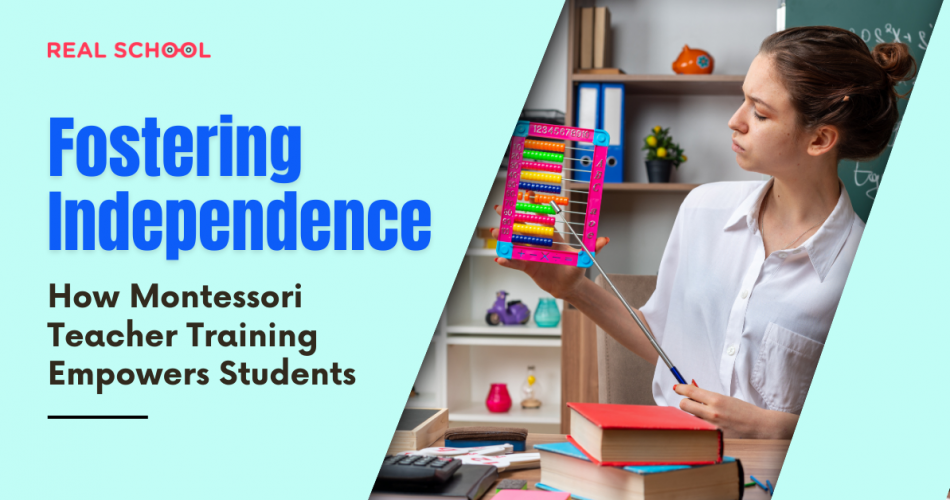Montessori teacher training plays a crucial role in empowering students by fostering independence, a cornerstone of the Montessori educational philosophy. Through a child-centered approach and carefully prepared environments, Montessori educators guide students to become self-motivated, confident, and responsible learners. The training equips teachers with the knowledge and skills to create an environment that encourages exploration, decision-making, and self-directed learning. In this article, we will explore how Montessori teacher training empowers students by fostering independence and nurturing their natural desire for growth and discovery.
-
Prepared Environment
Montessori teacher training emphasizes the importance of a prepared environment that supports independent learning. Educators learn how to organize the classroom with carefully selected materials and activities, allowing students to freely explore and engage with their interests. The prepared environment sparks curiosity and encourages students to take initiative in their learning journey.
-
Freedom Within Limits
In a Montessori classroom, students have the freedom to choose their activities within established boundaries. Montessori teacher training equips educators with the skills to set clear expectations and limits while allowing students the autonomy to make decisions about their learning. This freedom within limits fosters a sense of responsibility and self-discipline.
-
Personalized Learning
Montessori teacher training emphasizes the significance of individualized instruction. Educators learn to observe each student’s unique interests, strengths, and challenges. By tailoring lessons and activities to meet individual needs, teachers empower students to explore topics they are passionate about, creating a meaningful and personalized learning experience.
-
Self-Correction and Self-Assessment
Montessori teacher training equips educators with strategies to encourage self-correction and self-assessment in students. Montessori materials are designed to provide students with feedback, allowing them to recognize and correct their own errors. This process builds a sense of self-efficacy and a willingness to take ownership of their learning.
-
Time Management and Focus
In a Montessori environment, students are encouraged to work at their own pace and follow their interests. Montessori teacher training provides educators with insights on guiding students in time management and maintaining focus on their chosen activities. This skill of managing their time effectively becomes a valuable asset throughout their educational journey.
-
Problem-Solving Skills
Montessori teacher training emphasizes the development of problem-solving skills in students. Educators encourage students to tackle challenges independently, explore different solutions, and learn from their experiences. These problem-solving skills extend beyond academics, empowering students to face real-life situations with confidence.
-
Developing Critical Thinking
Critical thinking is nurtured through Montessori teacher training, as educators learn to prompt students to question, analyze, and explore ideas independently. Students become active participants in their learning process, engaging in meaningful discussions and developing their ability to think critically and logically.
-
Sense of Responsibility and Accountability
By fostering independence, Montessori teacher training cultivates a sense of responsibility and accountability in students. Educators help students understand the consequences of their actions, promoting a sense of ownership for their decisions and learning outcomes.
-
Building Self-Confidence
Montessori teacher training equips educators with the tools to build students’ self-confidence. By providing opportunities for success and acknowledging their efforts, teachers instill a sense of self-worth and belief in their abilities.
-
Lifelong Love for Learning
Ultimately, Montessori teacher training empowers students with a lifelong love for learning. By nurturing independence and self-directed learning, students become enthusiastic, curious, and motivated learners, ready to embrace a lifetime of growth and exploration.
Conclusion
Montessori teacher training plays a transformative role in empowering students by fostering independence and self-directed learning. Through a prepared environment, freedom within limits, and personalized instruction, students develop essential skills, such as time management, critical thinking, and problem-solving. By promoting responsibility, self-assessment, and a strong sense of self-confidence, Montessori educators prepare students for a lifetime of meaningful and self-motivated learning. The impact of Montessori teacher training extends far beyond the classroom, empowering students to become confident, resilient, and curious individuals who embrace the joy of learning throughout their lives.
FAQs (Frequently Asked Questions)
How does Montessori teacher training promote self-directed learning in students with diverse learning styles?
Can the principles of fostering independence be integrated into traditional educational settings?
How do Montessori teachers support students in overcoming challenges and building resilience?
What role does the prepared environment play in nurturing independence in young learners?
Can the impact of Montessori teacher training be observed in different age groups of students?







